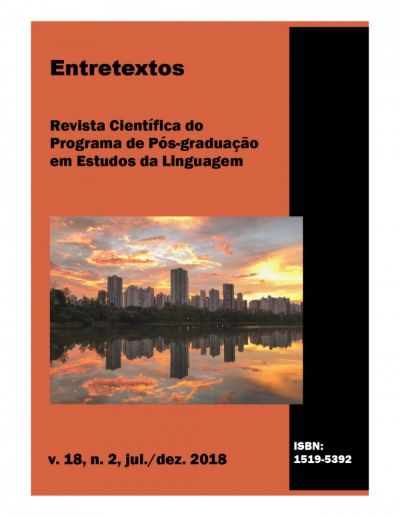The semantic-enunciative functioning of the word companheiro in Lula's political discourses
DOI:
https://doi.org/10.5433/1519-5392.2018v18n2p143Keywords:
Semantics of the Event, Political speech, Meaning, Companheiro.Abstract
From the theoretical and methodological perspective of Semantics of the Event, field of study of meaning initiated by Guimarães (2017), the present study aims at analysing the meanings of the word companheiro, extracted from Luís Inácio Lula da Silva's political speeches. Through this theory, it is necessary to observe the relation of the meaning of a word with the history and how it is affected by an event. A pathway of companheiro occurrences is, hence, made, regarding the meanings appropriated by the word along the history and in some of Lula's discourses. From the etymological perspective, given by the dictionary, we compare it with the meanings produced by the word executed in the selected contexts. The Caldas Aulete digital (AULETE, 2007) e Dicionário Houaiss (HOUAISS; VILLAR, 2009) were the used dictionaries. The selected contexts are from political discourses given in 2003 and 2007, in his inauguration as president of Brazil, and from other two speeches given in 2016 and 2018. The analyses show the effects of meaning of this word in Lula's enunciation, in his relation to history and to politics, repeating already stabilized meanings, on the one hand, and inaugurating other meanings, on the other.Downloads
References
AULETE, Francisco Julio Caldas. Aulete digital. 2007. Disponível em: http://www.aulete.com.br/. Acesso em: 5 maio 2018.
AULETE, Francisco Julio Caldas. Dicionário contemporâneo da língua portuguesa. 3. ed. Rio de Janeiro: Delta, 1974.
AUROUX, Sylvain. A revolução tecnológica da gramatização. Tradução de Eni Puccinelli Orlandi. 3. ed. Campinas: Editora da Unicamp, 2014.
BRASIL. Presidência da República. Pronunciamento à nação do Presidente da República, Luiz Inácio Lula da Silva, na cerimônia de posse. Brasília, 2007.
BRASIL. Presidência da República. Pronunciamento do Presidente da República, Luiz Inácio Lula da Silva, na sessão solene de posse no Congresso Nacional. Brasília, 2003.
BRÉAL, Michel. Ensaio de semântica: ciência das significações. Tradução de Eduardo Guimarães. 2. ed. Campinas: Editora RG, 2008.
BUENO, Francisco da Silveira. Dicionário etimológico-prosódico da língua portuguesa. Santos: Brasília, 1974.
CEREJA, Willian. Significação e tema. In: BRAIT, Beth (org.). Bakhtin: conceitos-chave. 5. ed. São Paulo: Contexto, 2014. p. 201-220.
FERREIRA, Aurélio Buarque Holanda. Novo Aurélio século XXI: o dicionário da língua portuguesa. Rio de janeiro: Nova Fronteira, 1999.
GUIMARÃES, Eduardo. A enumeração: funcionamento enunciativo e sentido. Cadernos de Estudos Linguísticos, Campinas, SP, n. 51, p. 49-68, 2009.
GUIMARÃES, Eduardo. A linguística é uma ciência histórica? In: BRÉAL, Michel. Ensaio de semântica: ciência das significações. 2. ed. Campinas: Editora RG, 2008. p. 9-15.
GUIMARÃES, Eduardo. A marca do nome. RUA, Campinas, SP, v. 9, n. 1, p. 19- 31, 2003.
GUIMARÃES, Eduardo. Semântica do acontecimento: um estudo enunciativo da designação. 2. ed. Campinas: Pontes, 2005.
GUIMARÃES, Eduardo. Semântica do acontecimento: um estudo enunciativo da designação. 4. ed. Campinas: Pontes, 2017.
HOUAISS, Antonio; VILLAR, Mauro de Salles. Dicionário Houaiss da língua portuguesa. Rio de Janeiro: Objetiva, 2009.
NASCENTES, Antenor. Dicionário etimológico da língua portuguesa. Rio de Janeiro: Oficinas Gráficas do Jornal do Commercio, 1955.
QUEIROZ, Érica Karine Ramos. O funcionamento semântico-enunciativo do nome próprio. Síntesis, Campinas, SP, v. 14, p. 344-359, 2009. Disponível em: http://revistas.iel.unicamp.br/index.php/sinteses/article/viewFile/1233/917. Acesso em: 17 maio 2018.
SCHERER, Amanda Eloina; PETRI, Verli. O funcionamento do político na produção de sentidos: o dicionário como trajeto de leitura. In: GRIGOLETTO, Evandra; NARDI, Fabiele Stockmans (org.). A análise do discurso e sua história: avanços e perspectivas. Campinas, SP: Pontes Editores, 2016. p. 359-373.
SILVA, Mariza Vieira. O dicionário e o processo de identificação do sujeitoanalfabeto. In: GUIMARÃES, Eduardo; ORLANDI, Eni Puccinelli (org.) Língua e cidadania: o português no Brasil. Campinas, SP: Pontes, 1996. p. 151-162
Downloads
Published
How to Cite
Issue
Section
License
Copyright (c) 2018 Entretextos

This work is licensed under a Creative Commons Attribution 4.0 International License.
Entretextos adota a Licença Creative Commons Attribution 4.0 International, portanto, os direitos autorais relativos aos artigos publicados são do/s autor/es.
Sob essa licença é possível: Compartilhar - copiar e redistribuir o material em qualquer suporte ou formato. Adaptar - remixar, transformar, e criar a partir do material, atribuindo o devido crédito e prover um link para a licença e indicar se mudanças foram feitas.























